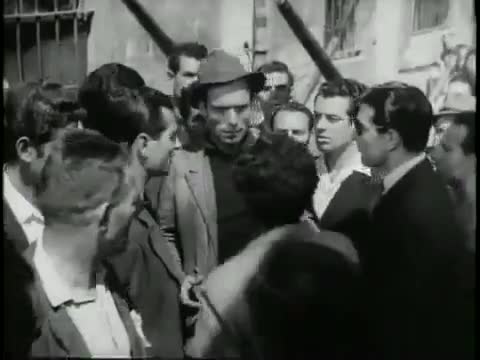Réalisation:
Vittorio De SicaPhotographie:
Carlo MontuoriMusique:
Alessandro CicogniniActeurs·trices:
Lamberto Maggiorani, Enzo Staiola, Lianella Carell, Gino Saltamerenda, Vittorio Antonucci, Giulio Chiari, Carlo Jachino, Emma Druetti (plus)VOD (1)
Résumés(1)
Au chômage depuis deux ans, Antonio Ricci a enfin trouvé une opportunité de travail. On lui propose un emploi de colleur d’affiche, mais il doit pour l’obtenir fournir lui-même un vélo. Alors qu’il a vendu tout ce qu’il pouvait vendre pour se le procurer, un jeune homme lui dérobe le précieux objet. (LaCinetek)
Critiques (5)
For me, this is probably the strongest film of Italian neorealism and Vittorio De Sica. Its attractiveness and power lie in the naturalness that comes from the use of non-actors, knowledge of the filmed environment, and the difficult social reality of post-war Italy, which is struggling with a severe crisis, mass unemployment, and poverty. It is a film that is not burdened by artificial layers of commercial cinema, wherein emotions are conveyed alongside film images only through film music. It is a powerful film that is also emphasized by the black-and-white material. It is incredible how many unforgettable shots fit into just 90 minutes of footage. How many events can be fit into a single day of an ordinary municipal officer who is existentially dependent on his bicycle? The most interesting passages depict the existence of a large Roman lumpenproletariat. Overall impression: 95%. A classic film that is part of basic film education.
()
More than a cross-section of neorealist theory, The Bicycle Thieves struck me as a poignant symbolic statement about its bleak, depressing times. The theft of a bicycle and the subsequent search for it suffice as motives to fully understand the despair and misery of which it so subtly and stoically speaks. Pure cinematic language that doesn't need to exaggerate or rely on star filmmakers, just get out on the street, empathize with your characters and film, and the result will be disarming. 90%
()
A sad and depressing film. The beautiful and thorough scene structure and the amount of detail in the film convey the atmosphere of the time to the viewer (they say it's called neorealism -) ) and the ending is downright surprising.
()
Observer l'impuissance, le désespoir et le désespoir du protagoniste principal, dont le seul désir est de travailler et de subvenir aux besoins de sa famille, est une expérience accablante, car nous ne faisons que voir de plus en plus d'amertume et de déception. La lutte pour sa propre dignité est d'autant plus difficile qu'elle ne se déroule pas seulement devant lui-même, mais à travers son fils et sous les yeux des générations futures. Pour le spectateur du XXIe siècle, Rome des années 40, apparemment belle, dissimule plutôt le désespoir, pour lequel ni les prières ni Dieu ne peuvent aider, mais pour l'instant rien d'autre...
()
The premise may seem ridiculous. A man gets a job and needs a bike for it. But the bike is stolen from him. Nowadays, people would just shrug it off, but what creates a beautiful and cruel image of Italy at the time is the fact that the film's hero does not shrug it off and cannot shrug it off either. He needs the bike because otherwise he will be a poor man without a job again. It is a human testimony about a world where there is not a place for everyone. At least not the kind of place they would wish and need. It is extremely terrifying that this is our world and not one so distant.
()

